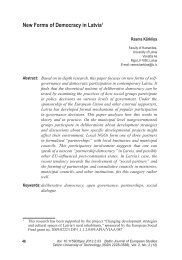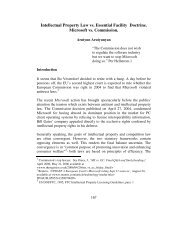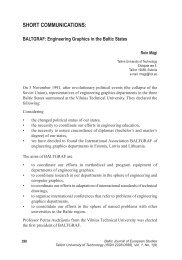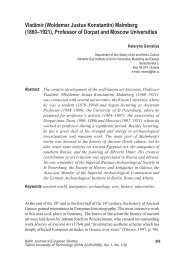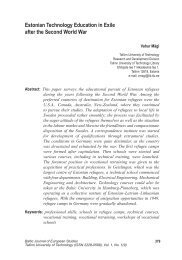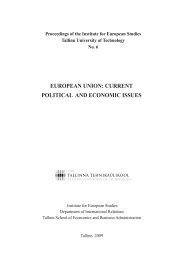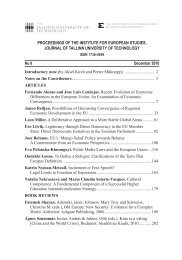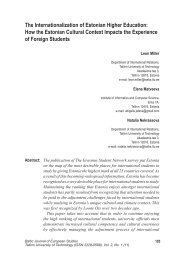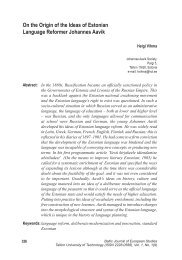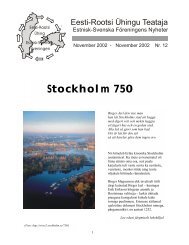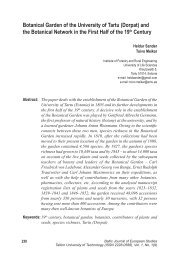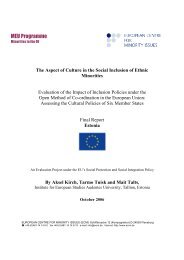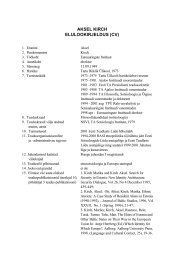Rein Vihalemm. Towards a Practical Realist Philosophy of Science
Rein Vihalemm. Towards a Practical Realist Philosophy of Science
Rein Vihalemm. Towards a Practical Realist Philosophy of Science
Create successful ePaper yourself
Turn your PDF publications into a flip-book with our unique Google optimized e-Paper software.
<strong>Rein</strong> <strong>Vihalemm</strong><br />
<strong>Towards</strong> a <strong>Practical</strong> <strong>Realist</strong> <strong>Philosophy</strong> <strong>of</strong> <strong>Science</strong><br />
<strong>Rein</strong> <strong>Vihalemm</strong><br />
Department <strong>of</strong> <strong>Philosophy</strong>,<br />
Institute <strong>of</strong> <strong>Philosophy</strong> and Semiotics,<br />
University <strong>of</strong> Tartu<br />
Ülikooli 18<br />
Tartu 50090, Estonia<br />
e-mail: <strong>Rein</strong>.<strong>Vihalemm</strong>@ut.ee<br />
Abstract: Both traditional scientific realism and empiricism, together with the<br />
idea that the development <strong>of</strong> science lies in constantly discovering<br />
new facts about the world and, by creating theories, connecting<br />
these facts in a logical manner, achieving a more complete and<br />
exact knowledge, so to speak, approaching the waiting truth or its<br />
“surrogate” – empirical adequacy –, have receded from the treatment<br />
<strong>of</strong> science, although they are not entirely gone. The post-Kuhnian<br />
philosophy <strong>of</strong> science, practised under different names, mainly those<br />
<strong>of</strong> qualified realism (such as ‘critical’, ‘constructive’, ‘experimental’,<br />
‘non-representative’, ‘referential’, ‘naturalistic’, but also the ones<br />
referring directly to practice – ‘pragmatic’ and ‘practical realism’),<br />
tends to be practice-based one way or the other. It seems appropriate<br />
to speak about practical realist philosophy <strong>of</strong> science. However, the<br />
notion ‘practical realist philosophy <strong>of</strong> science’ should be specified.<br />
In this paper the following questions are briefly discussed: (1) Sami<br />
Pihlström has shown that pragmatist philosophy <strong>of</strong> science can be<br />
interpreted as a variety <strong>of</strong> realism – pragmatic realism. Are there any<br />
reasons to differentiate ‘pragmatic realism’ from ‘practical realism’?<br />
It is emphasised that the roots <strong>of</strong> practical realism can be found<br />
in Marx’s conception <strong>of</strong> practice; (2) Joseph Rouse is developing<br />
practice-based philosophy <strong>of</strong> science as a radical philosophical<br />
naturalism. Are there any reasons to differentiate practical realism<br />
from Rouse’s conception? (3) Ilkka Niiniluoto’s ‘critical scientific<br />
realism’ also seems to be close to practical realism, though he is<br />
known as a defender <strong>of</strong> the standard scientific realist correspondent<br />
theory <strong>of</strong> truth. What is actually the point <strong>of</strong> the criticism <strong>of</strong> classical<br />
correspondence in practical realism? 4) Nicholas Maxwell is known<br />
as a critic <strong>of</strong> so-called ‘standard empiricism’ associated with ‘the<br />
philosophy <strong>of</strong> knowledge’ and proponent <strong>of</strong> ‘aim-oriented empiricism’<br />
46<br />
Baltic Journal <strong>of</strong> European Studies<br />
Tallinn University <strong>of</strong> Technology (ISSN 2228-0588), Vol. 1, No. 1(9)
<strong>Towards</strong> a <strong>Practical</strong> <strong>Realist</strong> <strong>Philosophy</strong> <strong>of</strong> <strong>Science</strong><br />
and, more generally, <strong>of</strong> ‘aim-oriented rationalism’ associated with<br />
‘the philosophy <strong>of</strong> wisdom’. Perhaps this conception can actually be<br />
also seen as a ‘practical realist philosophy <strong>of</strong> science’?<br />
Keywords: empiricism, Kantianism, Marxism, metaphysics, naturalism,<br />
philosophy <strong>of</strong> science, practice, pragmatism, scientific realism<br />
Introduction<br />
In a sense this paper can be regarded as a continuation <strong>of</strong> the presentation at<br />
the 22 nd Baltic Conference on the History <strong>of</strong> <strong>Science</strong> in Vilnius (<strong>Vihalemm</strong>,<br />
2006). That was a reflection, focusing on the conception <strong>of</strong> the practical nature<br />
<strong>of</strong> science, on the development <strong>of</strong> philosophy <strong>of</strong> science in Estonia. Estonian<br />
philosophy <strong>of</strong> science was born in Soviet times – that is, in abnormal conditions<br />
when the Soviet-style Marxist philosophy was compulsory. However, in the field<br />
<strong>of</strong> philosophy <strong>of</strong> science it was possible to almost ignore the <strong>of</strong>ficial dogmatised<br />
Marxism. Besides practising ‘Foreword Marxism’ (i.e. being a Marxist-Leninist<br />
only declaratively, presenting the obligatory viewpoints in the foreword and<br />
concluding remarks, but practising substantially, so to speak, normal research),<br />
one could also proceed genuinely from Marx’s ideas, especially and first<br />
<strong>of</strong> all from the conception <strong>of</strong> practice (though consistent proceeding from<br />
this conception was actually considered heresy). The conception <strong>of</strong> practice<br />
(although mainly not in association with Marx) can be seen as the origin <strong>of</strong><br />
several approaches also in contemporary philosophy <strong>of</strong> science in which<br />
the practical, being simultaneously social and historical, nature <strong>of</strong> science is<br />
acknowledged, empiricism criticised and scientific realism defended.<br />
Both traditional scientific realism and empiricism, together with the idea that the<br />
development <strong>of</strong> science lies in constantly discovering new facts about the world<br />
and, by creating theories, connecting these facts in a logical manner, achieving<br />
a more complete and exact knowledge, so to speak, approaching the waiting<br />
truth or its “surrogate” – empirical adequacy –, have receded from the treatment<br />
<strong>of</strong> science, although are not entirely gone. The post-Kuhnian philosophy <strong>of</strong><br />
science, practised under different names, mainly those <strong>of</strong> qualified realism (such<br />
as ‘critical’, ‘constructive’, ‘experimental’, ‘non-representative’, ‘referential’,<br />
‘naturalistic’, but also the ones referring directly to practice – ‘pragmatic’ and<br />
‘practical realism’), tends to be practice-based one way or the other. It seems<br />
appropriate to speak about practical realist philosophy <strong>of</strong> science.<br />
Baltic Journal <strong>of</strong> European Studies<br />
Tallinn University <strong>of</strong> Technology (ISSN 2228-0588), Vol. 1, No. 1(9)<br />
47
<strong>Rein</strong> <strong>Vihalemm</strong><br />
However, the notion ‘practical realist philosophy <strong>of</strong> science’ should be specified.<br />
In my earlier papers I have characterised ‘practical realism’ by five main theses.<br />
I would point these out here as well:<br />
(1) science does not represent the world ‘as it really is’ from a god’s eye point<br />
<strong>of</strong> view;<br />
(2) the fact that the world is not accessible independently <strong>of</strong> theories – or, to be<br />
more precise, paradigms (practices) – developed by scientists does not mean<br />
that Putnam’s internal realism (or social constructivism) is acceptable;<br />
(3) science as a theoretical activity is only one aspect <strong>of</strong> it (<strong>of</strong> science) as a<br />
practical activity whose main form is scientific experiment which in its<br />
turn takes place in the real world, being a purposeful and critically theoryguided<br />
constructive, manipulative, material interference with nature;<br />
(4) science as practice is also a social-historical activity which means, among<br />
other things, that scientific practice includes a normative aspect, too, and<br />
that means, in its turn, that the world as it is actually accessible to science<br />
is not free from norms either;<br />
(5) though neither naïve nor metaphysical, it is certainly realism as it claims that<br />
what is ‘given’ in the form <strong>of</strong> scientific practice is an aspect <strong>of</strong> the real world.<br />
In this paper I will briefly and provisionally discuss the following points:<br />
Sami Pihlström has shown (1996; 2008) that pragmatist philosophy <strong>of</strong> science<br />
can be interpreted as a variety <strong>of</strong> realism – pragmatic realism. Are there any<br />
reasons to differentiate ‘pragmatic realism’ from ‘practical realism’?<br />
Joseph Rouse (1987; 1996; 2002; 2003) is developing practice-based philosophy<br />
<strong>of</strong> science as a radical philosophical naturalism. Are there any reasons to<br />
differentiate ‘practical realism’ from Rouse’s conception or naturalism in<br />
general (cf., e.g., Giere’s naturalism)?<br />
Ilkka Niiniluoto’s (1999) ‘critical scientific realism’ also seems to be close to<br />
‘practical realism’, though he is known as a defender <strong>of</strong> the standard scientific<br />
realist correspondent theory <strong>of</strong> truth. What is actually the point <strong>of</strong> the criticism<br />
<strong>of</strong> classical correspondence in practical realism?<br />
Nicholas Maxwell is known as a critic <strong>of</strong> so-called ‘standard empiricism’<br />
associated with ‘the philosophy <strong>of</strong> knowledge’ and proponent <strong>of</strong> ‘aim-oriented<br />
empiricism’ and, more generally, <strong>of</strong> ‘aim-oriented rationalism’ associated with<br />
‘the philosophy <strong>of</strong> wisdom’ (Maxwell, 1998; 2001; 2004; 2007). Perhaps this<br />
conception can actually be also seen as a ‘practical realist philosophy <strong>of</strong> science’?<br />
First <strong>of</strong> all I will try to comment on Sami Pihlström’s analysis <strong>of</strong> pragmatic<br />
realism from the viewpoint <strong>of</strong> practical realism.<br />
48<br />
Baltic Journal <strong>of</strong> European Studies<br />
Tallinn University <strong>of</strong> Technology (ISSN 2228-0588), Vol. 1, No. 1(9)
<strong>Towards</strong> a <strong>Practical</strong> <strong>Realist</strong> <strong>Philosophy</strong> <strong>of</strong> <strong>Science</strong><br />
‘Pragmatic’ or ‘practical’ realism?<br />
Naturally the issue whether there are any reasons to differentiate ‘pragmatic<br />
realism’ from ‘practical realism’ does not raise much interest when reduced to<br />
purely terminological difference, but this is what should be studied – whether<br />
it is really so. True, terminologically speaking I prefer ‘practical realism’,<br />
because ‘pragmatic’ – as is known, was once noted by the founder <strong>of</strong> pragmatist<br />
philosophy, Peirce himself – is associated with a vulgarised meaning, which refers<br />
to orienting solely on the expediency, to the practical consequences or concerns in<br />
the narrower sense, ignoring so to speak higher principles or theoretical aims and<br />
considerations, etc. Besides, the term ‘pragmatic’ is not appropriate for naming a<br />
variety <strong>of</strong> realism, because pragmatism in philosophy <strong>of</strong> science is <strong>of</strong>ten identified<br />
also with instrumentalism, understood (although incorrectly) as a denial <strong>of</strong> scientific<br />
realism. Coming back to Peirce as the founder <strong>of</strong> pragmatist philosophy <strong>of</strong> science<br />
once more, then Pihlström, for example, characterises Peirce as “a precursor <strong>of</strong><br />
scientific realism” and even that in “an important sense, Peirce is a classic <strong>of</strong> what<br />
is today known as scientific realism” (Pihlström, 2008, p. 30), admitting, on the<br />
other hand that “Peirce was […] also a speculative metaphysician” (Pihlström,<br />
2008, p. 29) and that “widely different interpretations [<strong>of</strong> his views] can be<br />
defended, the tension between realism and idealism remained, in any event, a real<br />
tension for him […]. As we have seen, his definition <strong>of</strong> ‘reality’ or ‘the real’ was<br />
in one sense realistic but, in an idealistic fashion, he seems to have identified the<br />
real and the knowable.” (Pihlström, 1996, p. 62)<br />
The essential question is how is practice understood? And then also, <strong>of</strong> course,<br />
how is realism understood in the realist philosophy <strong>of</strong> science? Or rather, whether<br />
and, if so, then how is it considered possible to recognise realism proceeding from<br />
practice, and moreover – even emphasise it? Pihlström’s analysis indicates, and<br />
I agree with him, that pragmatist philosophy <strong>of</strong> science – it has to be emphasised<br />
– can be interpreted as a variety <strong>of</strong> realism, pragmatic realism. However, it is not<br />
obvious that pragmatist philosophy <strong>of</strong> science as a philosophy proceeding from<br />
the understanding <strong>of</strong> science as practice is a variety <strong>of</strong> realism at all. According to<br />
Pihlström, “[t]he only thing that is clear is that pragmatism, as such, is no enemy<br />
<strong>of</strong> (moderate) scientific realism” (Pihlström, 2008, p. 59). And he hopes that<br />
there is a “need to see [...] the realism issue as a genuinely pragmatic, and even<br />
pragmatist, one” (Pihlström, 2008, p. 61). For instance, Putnam’s ‘internal realis<br />
m’, which he also called ‘pragmatic realism’ belongs, however, to the tradition<br />
<strong>of</strong> Kantianism; that is, it is actually not realism at all (and above I have excluded<br />
Putnam’s ‘internal realism’ from the ‘practical realism’ as I see it) as it scarcely<br />
succeeds in avoiding conceptual idealism without a rational reconstruction. I<br />
Baltic Journal <strong>of</strong> European Studies<br />
Tallinn University <strong>of</strong> Technology (ISSN 2228-0588), Vol. 1, No. 1(9)<br />
49
<strong>Rein</strong> <strong>Vihalemm</strong><br />
agree with Ilkka Niiniluoto’s criticism <strong>of</strong> internal realism and his reconstruction<br />
<strong>of</strong> this view as ‘critical scientific realism’ (see Niiniluoto, 1999, ch. 7) which in<br />
its turn belongs, I think, to the conception that one might call ‘practical realism’<br />
in the philosophy <strong>of</strong> science as it can be interpreted in the context where the<br />
practical nature <strong>of</strong> science is stressed. (But the relationship between Niiniluoto’s<br />
‘critical scientific realism’ and ‘practical realism’ needs yet to be clarified; I shall<br />
return to this issue below). Pihlström also writes, “[i]t is not easy to say, after<br />
all, whether Putnam thinks that the world ‘objectively’ or ‘mind-independently’<br />
exists” (Pihlström, 1996, p. 29). But one cannot speak <strong>of</strong> a position as realist<br />
in philosophy <strong>of</strong> science without accepting this thesis and – it should be added<br />
also, I would like to emphasise – interpreting it materialistically in the sense that<br />
this position excludes not only subjective idealism, but objective idealism and<br />
dualism as well. So, the expression ‘practical realism’ is actually synonymous<br />
with ‘practical materialism’ (and perhaps also with ‘practical naturalism’).<br />
According to practical realism (or practical materialism), consciousness,<br />
thought, mind or spirit cannot exist before or independently <strong>of</strong> the socialhistorical<br />
practice and this practice cannot be “outside” <strong>of</strong> objective reality.<br />
Practice-based approach criticises, <strong>of</strong> course, the naïve, or non-critical realism<br />
and metaphysical realism, because in the case <strong>of</strong> these it is claimed to be possible<br />
to somehow “see” the world “outside” <strong>of</strong> practice. The practice-based approach<br />
also accentuates the difficulties in traditional comprehension <strong>of</strong> knowledge,<br />
language and the truth. These difficulties arise from knowledge being seen –<br />
one could say, non-naturalistically – in an abstract manner as only the content<br />
<strong>of</strong> concepts and truthful statements expressed in language, unrelated to practice,<br />
in which knowledge and language are formed in reality, whereas what this<br />
knowledge or truthful content <strong>of</strong> linguistic expressions is, how it is found or<br />
how, if at all, it is connected with reality (language and the knowledge somehow<br />
contained in it are as if outside the real world) remains unexplained.<br />
<strong>Practical</strong> realism proceeds from the notion that knowledge cannot be understood<br />
as a representation <strong>of</strong> a world independent <strong>of</strong> the cognitive subject and neither<br />
can the cognitive subject be comprehended independently <strong>of</strong> the cognisable<br />
world. The knowledge, as well as the cognitive subject and the cognisable<br />
world are formed in practice. To speak about the world outside practice means<br />
to speak about something indefinable or illusory. It is only through the means <strong>of</strong><br />
practice that the objective world can really exist for humans. Knowledge must<br />
therefore be regarded as understanding how the world is formed in practice, how<br />
it becomes defined. From the viewpoint <strong>of</strong> traditional realism it may seem as<br />
giving up realism and cognisability <strong>of</strong> the world, accepting Kant’s viewpoint,<br />
according to which an objective world independent <strong>of</strong> the subject remains a<br />
50<br />
Baltic Journal <strong>of</strong> European Studies<br />
Tallinn University <strong>of</strong> Technology (ISSN 2228-0588), Vol. 1, No. 1(9)
<strong>Towards</strong> a <strong>Practical</strong> <strong>Realist</strong> <strong>Philosophy</strong> <strong>of</strong> <strong>Science</strong><br />
‘thing-in-itself’; the only world accessible to knowledge is the empirical one<br />
formed by the subject in cognition. But the position <strong>of</strong> practice is, in principle,<br />
different from that <strong>of</strong> Kant. Proceeding from practice helps to explain that in<br />
reality, the objective world cannot be for knowledge an ungraspable ‘thing-initself’,<br />
but appears as a ‘thing for us’. The notion ‘thing-in-itself’ is an empty<br />
abstraction where the inexhaustible objective world has been made indefinable<br />
by excluding any contact with the subject.<br />
Karl Marx on practice<br />
Speaking about practice it is still necessary to emphasise that although pragmatism<br />
is practice-based philosophy by name already, it is neither the first nor the only<br />
discipline <strong>of</strong> philosophy that sees practice as the basic concept <strong>of</strong> philosophy.<br />
Practice is the starting and base conception <strong>of</strong> Karl Marx’s philosophy. Up to now<br />
the most significant works in this relation are Theses on Feuerbach (Marx, 1845)<br />
and The German Ideology (Marx & Engels, 1845). For instance, Sidney Hook, one<br />
<strong>of</strong> the developers <strong>of</strong> pragmatism, who calls it experimental naturalism, has also<br />
found that Marx’s critical theses about Ludwig Feuerbach – Hook has provided a<br />
thorough analysis <strong>of</strong> these in his From Hegel to Marx: Studies in the Intellectual<br />
Development <strong>of</strong> Karl Marx (Hook, 1976) – contain an important turning point in<br />
the history <strong>of</strong> philosophy. 1 In the first thesis, Marx writes,<br />
The main defect <strong>of</strong> all hitherto-existing materialism – that <strong>of</strong><br />
Feuerbach included – is that the Object [der Gegenstand], actuality,<br />
sensuousness, are conceived only in the form <strong>of</strong> the object [Objekts],<br />
or <strong>of</strong> contemplation [Anschauung], but not as human sensuous<br />
activity, practice [Praxis], not subjectively. Hence it happened that<br />
the active side, in opposition to materialism, was developed by<br />
idealism – but only abstractly, since, <strong>of</strong> course, idealism does not<br />
know real, sensuous activity as such. Feuerbach wants sensuous<br />
objects [Objekte], differentiated from thought-objects, but he does not<br />
conceive human activity itself as objective [gegenständliche] activity.<br />
In The Essence <strong>of</strong> Christianity [Das Wesen des Christenthums], he<br />
therefore regards the theoretical attitude as the only genuinely human<br />
attitude, while practice is conceived and defined only in its dirty-<br />
Jewish form <strong>of</strong> appearance [Erscheinungsform]… (Marx, 1845)<br />
1<br />
See Hook, 1976, p. 273: “I believe that Marx’s critical theses on Feuerbach represent in<br />
nuce a turning point in the history <strong>of</strong> philosophy.”<br />
Baltic Journal <strong>of</strong> European Studies<br />
Tallinn University <strong>of</strong> Technology (ISSN 2228-0588), Vol. 1, No. 1(9)<br />
51
<strong>Rein</strong> <strong>Vihalemm</strong><br />
In the second thesis:<br />
The question whether objective truth can be attributed to human<br />
thinking is not a question <strong>of</strong> theory but is a practical question. Man<br />
must prove the truth, i.e., the reality and power, the this-sidedness<br />
[Diesseitigkeit] <strong>of</strong> his thinking, in practice. The dispute over the<br />
reality or non-reality <strong>of</strong> thinking which is isolated from practice is a<br />
purely scholastic question. (Marx, 1845)<br />
At the same time Marx also criticises the abstract, individual-based understanding<br />
<strong>of</strong> human being, and emphasises that in reality, it is the ensemble <strong>of</strong> the social<br />
relations. “All social life”, he writes in his eighth thesis, “is essentially practical.<br />
All mysteries which lead theory to mysticism find their rational solution in<br />
human practice and in the comprehension <strong>of</strong> this practice” (Marx, 1845). This<br />
kind <strong>of</strong> social practice is historical by its nature. Speaking about history, The<br />
German Ideology first and foremost emphasises that “[o]ne can look at history<br />
from two sides and divide it into the history <strong>of</strong> nature and the history <strong>of</strong> men.<br />
The two sides are, however, inseparable; the history <strong>of</strong> nature and the history <strong>of</strong><br />
men are dependent on each other so long as men exist.” (Marx & Engels, 1845)<br />
Further, human history is defined as<br />
nothing but the succession <strong>of</strong> the separate generations, each <strong>of</strong><br />
which exploits the materials, the capital funds, the productive forces<br />
handed down to it by all preceding generations, and thus, on the<br />
one hand, continues the traditional activity in completely changed<br />
circumstances and, on the other, modifies the old circumstances with<br />
a completely changed activity (Marx & Engels, 1845).<br />
The difference between understanding Marxist and pragmatist practice is mainly<br />
seen in the fact that the first emphasises the social and historical character <strong>of</strong><br />
human activity – even in case <strong>of</strong> an individual –, as conveyed by material and<br />
intellectual culture; pragmatism, however, usually concentrates on activity –<br />
even in case <strong>of</strong> social activity – from the viewpoint <strong>of</strong> an individual.<br />
Like in terms <strong>of</strong> pragmatism, which Pihlström has characterised very well, the<br />
relationship between practice and realism has been understood differently, Marx’s<br />
approach on practice and also his realism or, to be more exact, materialism,<br />
have also been perceived in quite different ways. Unfortunately, an important<br />
disturbing issue still lies in the fact that Marx’s approach on practice is <strong>of</strong>ten<br />
perceived not in the context <strong>of</strong> serious philosophy, but rather an ideological<br />
basis <strong>of</strong> a failed political doctrine.<br />
52<br />
Baltic Journal <strong>of</strong> European Studies<br />
Tallinn University <strong>of</strong> Technology (ISSN 2228-0588), Vol. 1, No. 1(9)
<strong>Towards</strong> a <strong>Practical</strong> <strong>Realist</strong> <strong>Philosophy</strong> <strong>of</strong> <strong>Science</strong><br />
<strong>Practical</strong> realism and naturalism<br />
Indeed, as was mentioned already, practical realism can be regarded also as a<br />
kind <strong>of</strong> naturalism. Pihlström has said the same concerning pragmatic realism.<br />
And above I referred to Sidney Hook, who has written that he regarded “the<br />
philosophy <strong>of</strong> experimental naturalism [...] as a continuation <strong>of</strong> what is soundest<br />
and most fruitful in Marx’s philosophical outlook upon the world” (Hook, 1976,<br />
p. 1). But this is, <strong>of</strong> course, so to speak, practice-based naturalism, not some kind<br />
<strong>of</strong> biological or reductionistic approach. It is an anti-metaphysical approach in<br />
the sense that it rejects any attempts to accept something like ‘first philosophy’,<br />
metaphysical foundations, the ontology I appreciate Joseph Rouse’s practicebased<br />
philosophy <strong>of</strong> science and in this connection his radical philosophical<br />
naturalism as well (Rouse, 1987; 1996; 2002; 2003). It seems to me that it<br />
corresponds, in principle, with the ideas <strong>of</strong> practical realism.<br />
Rouse – and also, e.g., Giere – have referred to Kuhn as advocating actually,<br />
though not explicitly, a ‘naturalised’ philosophy <strong>of</strong> science (Giere, 1988, p. 33),<br />
but have emphasised also that his ideas should be developed further in this<br />
direction <strong>of</strong> naturalised and practice-based account <strong>of</strong> science, “further [...] than<br />
he himself would be happy with” (Rouse, 1987, p. 27). As for Kuhn himself<br />
there is reason to speak about the wrong turn in the development <strong>of</strong> his thought:<br />
Kuhn [...] started out with a strong naturalistic streak [...] in order to<br />
build his accounts <strong>of</strong> scientific change and the nature <strong>of</strong> observation<br />
and scientific thought. But by the 1970s Kuhn’s work had taken on<br />
a much more purely philosophical, a priori, tone. [...] I suggest,<br />
nonetheless, that Kuhn’s most valuable contribution is to be found in<br />
The Structure <strong>of</strong> Scientific Revolutions and not in his later work, and<br />
that the naturalistic direction <strong>of</strong> the former [...] deserve[s] further<br />
study. (Bird, 2002, p. 443).<br />
According to Pihlström, too,<br />
It was Kuhn in particular, I suggest, who smuggled pragmatist ideas<br />
into the philosophy <strong>of</strong> science, making possible a (Deweyan-like)<br />
historicist pragmatic naturalism [...] In the field today, thinkers like<br />
Rouse carry this task forward, usually without explicitly linking their<br />
views with the pragmatist tradition. This makes Rouse’s take on Kuhn<br />
somewhat unpragmatist [...], which is unfortunate [...] (Pihlström,<br />
2008, p. 60).<br />
Baltic Journal <strong>of</strong> European Studies<br />
Tallinn University <strong>of</strong> Technology (ISSN 2228-0588), Vol. 1, No. 1(9)<br />
53
<strong>Rein</strong> <strong>Vihalemm</strong><br />
Maybe, however, there is no need to interpret and develop Kuhn’s approach<br />
further along the pragmatist line, but do so along the practical realist naturalist<br />
line? As Pihlström (2008, p. 56) also concedes, “Rouse may have his own<br />
reasons for not wanting to label his position ‘pragmatist’ at all.” It seems to me<br />
that it would be appropriate to label his position as ‘practical realist’.<br />
<strong>Practical</strong> realism and critical scientific realism<br />
As said above, I agree with Ilkka Niiniluoto’s criticism <strong>of</strong> Putnam’s internal<br />
realism. There is an essential difference between internal realism and practical<br />
realism (or Niiniluoto’s critical scientific realism), as the former belongs to the<br />
tradition <strong>of</strong> Kantianism and cannot actually be qualified as realism at all. It is<br />
acknowledged that the scientific account <strong>of</strong> the world is mediated by our practical<br />
and theoretical activity, which means, indeed, that our descriptions <strong>of</strong> the world,<br />
our ‘world-versions’ are always relative to us. This does not imply, however, that<br />
the world itself (we can call it the world) is relative to us in the sense that our<br />
‘world-versions’ cannot be versions <strong>of</strong> the world (see Niiniluoto, 1999, pp. 218–<br />
226). Our scientific ‘world-versions’, although they represent the world through<br />
conceptual frameworks or, more precisely, through paradigms in the Kuhnian<br />
sense, interpreted in its turn as practices, still do tell us something about the<br />
world, as do theories we have constructed, which, in their theoretical models,<br />
contain experimentally substantiated idealisations, since theoretical models are<br />
similar to the real systems in specified respects and to specified degrees (see<br />
Giere, 1988, p. 81). As Niiniluoto (1999, p. 216) writes, “Conceptual frameworks<br />
are selected on the basis <strong>of</strong> our cognitive and practical purposes, and they can<br />
always be improved and made descriptively more complete”. If we use the cookiecutter<br />
metaphor we can say, “A cake [the world] can be sliced into pieces in a<br />
potentially infinite number <strong>of</strong> ways, and the resulting slices [say, natural kinds<br />
and laws <strong>of</strong> nature identified by us] are human constructions made out <strong>of</strong> the parts<br />
[unidentified (complex, inexhaustible) objects, their properties and relations] <strong>of</strong><br />
the cake” (Niiniluoto, 1999, p. 222).<br />
However, from the practical realist view, Niiniluoto’s approach which is<br />
language- and logic-centred, seems to be too abstract as the context <strong>of</strong> practice is<br />
not thematised in it; more precisely: Niiniluoto’s scientific realism is not based<br />
on the conception <strong>of</strong> practice, though a few arguments from practice, referring<br />
to Marx (1845) and Engels (1886) are used (see Niiniluoto, 1999, pp. 39, 275).<br />
His critical scientific realism shares the standard scientific realist correspondent<br />
54<br />
Baltic Journal <strong>of</strong> European Studies<br />
Tallinn University <strong>of</strong> Technology (ISSN 2228-0588), Vol. 1, No. 1(9)
<strong>Towards</strong> a <strong>Practical</strong> <strong>Realist</strong> <strong>Philosophy</strong> <strong>of</strong> <strong>Science</strong><br />
theory <strong>of</strong> truth according to which “[t]ruth is a semantical relation between<br />
language and reality. Its meaning is given by a modern (Tarskian) version <strong>of</strong><br />
the correspondent theory, and its best indicator is given by systematic enquiry<br />
using the methods <strong>of</strong> science” (Niiniluoto, 1999, p. 10). Niiniluoto emphasises<br />
that this thesis separates the semantic realists from all kinds <strong>of</strong> pragmatists, who<br />
replace this realist account <strong>of</strong> truth with some epistemic surrogate (Niiniluoto,<br />
1999, pp. 11–12). This standard realist understanding <strong>of</strong> knowledge, the world<br />
and their relations outside practice should be revised, I think.<br />
I cannot speak for pragmatists, but in practical realism, “truth” can be interpreted<br />
in a deflationary way and this interpretation is compatible with semantic realism.<br />
I agree with Joseph Rouse (1987, p. 147) that reasons for accepting deflation<br />
should be “perhaps somewhat different from those <strong>of</strong> most deflationists”. He<br />
writes,<br />
If I think that there are no substantive issues concerning truth, it<br />
is because I see the issues situated on the right side <strong>of</strong> the Tarski<br />
equivalence instead <strong>of</strong> the left. There are no fundamental philosophical<br />
issues peculiar to the concept <strong>of</strong> truth, for they are the same issues<br />
that arise concerning how things have any determinations at all.<br />
What is it for snow to be white? [Standard] [r]ealists think that things<br />
have such determinations independent <strong>of</strong> our practices, desires, and<br />
beliefs. [...] I think that what there is cannot be entirely separated<br />
from who we are and what we do. (Rouse, 1987, pp. 147–148)<br />
Niiniluoto also emphasises that it is important to make a distinction between<br />
unidentified and identified objects. the world contains unidentified objects<br />
which are identifiable, but not “‘self-identifying objects’ in the bad metaphysical<br />
sense [...]: they are potentially identifiable by us [see the cookie-cutter metaphor<br />
above, again]” (Niiniluoto, 1999, p. 221).<br />
In order to better understand the practical realist account <strong>of</strong> truth and reality it<br />
is appropriate to quote Rouse (1987) again. It seems to me that Niiniluoto could<br />
agree with that. Rouse writes,<br />
[t]he predicate ‘true’ can be applied only to sentences in language.<br />
[...] [A language] connects assertions with truth conditions but does<br />
not determine whether those conditions obtain. Similarly, what exists<br />
depends upon the field <strong>of</strong> meaningful interaction and interpretation<br />
within which things can be encountered. This configuration <strong>of</strong><br />
practices (including, <strong>of</strong> course, linguistic practice) allows things<br />
to show themselves as they are in a variety <strong>of</strong> respects. [...] The<br />
Baltic Journal <strong>of</strong> European Studies<br />
Tallinn University <strong>of</strong> Technology (ISSN 2228-0588), Vol. 1, No. 1(9)<br />
55
<strong>Rein</strong> <strong>Vihalemm</strong><br />
recognition that the possible ways a thing can be depends upon the<br />
configuration <strong>of</strong> practices within which they become manifest should<br />
therefore not reinforce the realist’s fear that we are being described<br />
as ‘world makers’. The language we speak does not determine which<br />
<strong>of</strong> its sentences are true. The practices that constitute our ‘world’<br />
likewise do not determine which things exist, with what properties.<br />
(Rouse, 1987, pp. 160–161).<br />
Actually Niiniluoto (1999, p. 275) also refers to Engels’ <strong>of</strong>ten-quoted statement<br />
on practice as the criterion <strong>of</strong> truth which is relevant here:<br />
If we are able to prove the correctness <strong>of</strong> our conception <strong>of</strong> a natural<br />
process by making it ourselves, bringing it into being out <strong>of</strong> its<br />
conditions and making it serve our own purposes into the bargain,<br />
then there is an end to the Kantian ungraspable ‘thing-in-itself’. The<br />
chemical substances produced in the bodies <strong>of</strong> plants and animals<br />
remained just such ‘things-in-themselves’ until organic chemistry<br />
began to produce them one after another, whereupon the ‘thing-initself’<br />
became a thing for us… (Engels, 1886)<br />
Uncompromisingly against standard empiricism:<br />
how does it concern metaphysics?<br />
In my opinion also the above-mentioned Nicholas Maxwell’s approach on<br />
science (Maxwell, 1998; 2001; 2004; 2007) can be, and is, interesting to be<br />
viewed within the framework <strong>of</strong> practical realism. Maxwell proceeds from<br />
science as practice in the sense that he intends to make explicit presuppositions,<br />
aims and methods which are implicit in scientific practice and thanks to which<br />
its – as an aim-oriented rational action – progress has actually been achieved.<br />
He also argues that<br />
the current deep division <strong>of</strong> Sociology <strong>of</strong> <strong>Science</strong> and <strong>Philosophy</strong><br />
<strong>of</strong> <strong>Science</strong> would entirely disappear; these two disciplines, still at<br />
loggerheads with one another, would become one and the same<br />
[methodological] discipline [called, as was said here in Introduction,<br />
‘aim-oriented empiricism’ and, more generally, ‘aim-oriented<br />
rationalism’]. The current dispute between Sociology and <strong>Philosophy</strong><br />
<strong>of</strong> <strong>Science</strong> is a symptom <strong>of</strong> the deep malaise from which the whole<br />
academic inquiry [where the philosophy <strong>of</strong> knowledge is dominant]<br />
56<br />
Baltic Journal <strong>of</strong> European Studies<br />
Tallinn University <strong>of</strong> Technology (ISSN 2228-0588), Vol. 1, No. 1(9)
<strong>Towards</strong> a <strong>Practical</strong> <strong>Realist</strong> <strong>Philosophy</strong> <strong>of</strong> <strong>Science</strong><br />
suffers, in seeking knowledge rather than promote wisdom by<br />
cooperatively rational means [which presupposes the philosophy <strong>of</strong><br />
wisdom]. (Maxwell, 2007, p. 9)<br />
Maxwell does not explicitly speak about practice-based philosophy <strong>of</strong> science,<br />
bearing in mind the practical realist philosophy <strong>of</strong> science, nor does he refer to<br />
the authors that can be considered practical realists, but the coincidences <strong>of</strong> his<br />
views with practical realism in several important points are very obvious. When<br />
we look at the five previously mentioned points characterising practical realism<br />
(see Introduction), then Maxwell clearly acknowledges points 1 and 2; he does<br />
not explicitly emphasise point 3 and thus does not proceed explicitly from<br />
practice in his approach, although, speaking about science in terms <strong>of</strong> his ‘aimoriented<br />
empiricism’ he does, <strong>of</strong> course, refer to and presume the experimental<br />
basis <strong>of</strong> science, the character <strong>of</strong> science as a purposeful and critically theoryguided<br />
practical activity. Points 4 and 5 are obviously, again, very important for<br />
him. Unfortunately, considerations <strong>of</strong> space prevent me to dwell on Maxwell’s<br />
ideas and their connection with practical realism a little more thoroughly in this<br />
paper. I will here very briefly touch upon only his uncompromising criticism <strong>of</strong><br />
standard empiricism, asking whether this criticism needs to be associated in a<br />
sense, specified by Maxwell, with metaphysical considerations.<br />
First <strong>of</strong> all I would like to emphasise that Maxwell’s criticism <strong>of</strong> standard<br />
empiricism meets with approval in practical realism. However, in practical<br />
realism the question does not arise – as Maxwell actually puts it – in the<br />
form <strong>of</strong> a dilemma: either standard empiricism, or a metaphysically oriented<br />
conception. 2 Maxwell argues that “science makes a metaphysical assumption,<br />
using ‘metaphysical’ in exactly the standard way it has come to be understood<br />
in philosophy <strong>of</strong> science, after Karl Popper. A proposition is metaphysical if<br />
it is empirically unfalsifiable.” (Maxwell, 2009, p. 108) Sure, that is correct if<br />
we understand the question in such a standard philosophy <strong>of</strong> science context<br />
in which science is regarded as a system <strong>of</strong> statements created for a scientific<br />
representation <strong>of</strong> the world, whereas the only link between the world and its<br />
2<br />
To prevent misunderstandings it is important to note that Maxwell is bearing in mind<br />
metaphysical component in science itself, i.e. he does not contrast here metaphysics to<br />
science, but sees that correctly identified scientific method contains implicitly also a<br />
component which qualifies from the viewpoint <strong>of</strong> standard empiricism as a metaphysical<br />
one. Maxwell writes, “According to standard empiricism, the critical study <strong>of</strong> the aims<br />
and methods <strong>of</strong> science — the philosophy <strong>of</strong> science — is to be sharply distinguished<br />
from science itself, just because ideas as to what the aims and methods <strong>of</strong> science ought<br />
to be are not, in any straightforward sense, empirically testable theories.” (Maxwell,<br />
2007, p. 258)<br />
Baltic Journal <strong>of</strong> European Studies<br />
Tallinn University <strong>of</strong> Technology (ISSN 2228-0588), Vol. 1, No. 1(9)<br />
57
<strong>Rein</strong> <strong>Vihalemm</strong><br />
representation seems to be sense experience. 3 In the context <strong>of</strong> practical realist<br />
philosophy <strong>of</strong> science, however,<br />
[t]he question is not how we get from a linguistic representation <strong>of</strong> the<br />
world to the world represented. We are already engaged with the world<br />
in practical activity, and the world simply is what we are involved<br />
with. The question <strong>of</strong> access to the world, to which the appeal to<br />
observation was a response, never arises. The important categories for<br />
characterizing the ways the world becomes manifest to us are therefore<br />
not the observable and unobservable. We must ask instead about what<br />
is available to be used, what we have to take account <strong>of</strong> in using it, and<br />
what we are aiming toward as a goal. (Rouse, 1987, p. 143)<br />
Therefore in the context <strong>of</strong> practical realist philosophy <strong>of</strong> science, where science<br />
is not construed abstractly as a system <strong>of</strong> knowledge, but as a practical activity,<br />
the abovementioned dilemma – empiricism or acceptance <strong>of</strong> metaphysics as part<br />
<strong>of</strong> scientific knowledge – never arises either.<br />
The empiricism/metaphysics problem seems to be rooted in the traditions <strong>of</strong><br />
the Cartesian conception <strong>of</strong> mind, together with his dualism, and the Humean<br />
conception <strong>of</strong> experience. When one clearly gives up these traditions, there will<br />
be no getting stuck in Kantian dualism <strong>of</strong> the empirical world <strong>of</strong> phenomena<br />
(observables), and the world regarded from the transcendental (metaphysical)<br />
perspective as the transcendent world <strong>of</strong> noumena (unobservables). According<br />
to practical realism, as shown above, there is one real world which is complex,<br />
inexhaustible, and can manifest itself in practice in a potentially infinite number<br />
<strong>of</strong> ways, i.e. in principle there can be an infinite number <strong>of</strong> real ‘world-versions’.<br />
Maxwell also criticises the Cartesian–Humean–Kantian traditions and<br />
emphasises that there is one real world: “The very distinction between ‘the<br />
physical universe’ and ‘the world <strong>of</strong> human experience’ is, as it were, an artefact<br />
<strong>of</strong> our understanding rather than something that exists in reality” (Maxwell,<br />
2007, p. 282). Maxwell (2001) deals especially with “the human world/physical<br />
universe problem” which is, as the author emphasises, “the fundamental problem<br />
<strong>of</strong> philosophy” (Maxwell, 2001, p. 18). Here we can see an analogy with “the<br />
great basic question <strong>of</strong> all philosophy” formulated by Engels in the Marxist<br />
practice-based philosophy as the question <strong>of</strong> the relations <strong>of</strong> thinking and being,<br />
examined from two, so to speak, ontological and epistemological aspects, while<br />
accepting also that the “most telling refutation <strong>of</strong> [...] all [...] philosophical<br />
crotchets is practice” (Engels, 1886, ch. 2).<br />
3<br />
Cf. Quine, 1975, p. 75: “Whatever evidence there is for science is sensory evidence.”<br />
58<br />
Baltic Journal <strong>of</strong> European Studies<br />
Tallinn University <strong>of</strong> Technology (ISSN 2228-0588), Vol. 1, No. 1(9)
<strong>Towards</strong> a <strong>Practical</strong> <strong>Realist</strong> <strong>Philosophy</strong> <strong>of</strong> <strong>Science</strong><br />
Acknowledgement<br />
The research was supported by the Estonian <strong>Science</strong> Foundation grant no. 7946.<br />
References<br />
Bird, A. (2002), ‘Kuhn’s wrong turning.’ Studies in History and <strong>Philosophy</strong> <strong>of</strong> <strong>Science</strong>,<br />
vol. 33, no. 3, pp. 443–463.<br />
Engels, F. (1886), Ludwig Feuerbach and the Outcome <strong>of</strong> Classical German <strong>Philosophy</strong>.<br />
[Online] Retrieved from http://search.marxists.org/archive/marx/works/download/<br />
Marx_Ludwig_Feurbach_and_the_End_<strong>of</strong>_German_Classical_Philosop.pdf<br />
[accessed April 2011]<br />
Giere, R. N. (1988), Explaining <strong>Science</strong>: A Cognitive Approach. London & Chicago:<br />
The University <strong>of</strong> Chicago Press.<br />
Hook, S. (1976), From Hegel to Marx: Studies in the Intellectual Development <strong>of</strong> Karl<br />
Marx, 5 th edition (1 st ed. 1950). Ann Arbor: The University <strong>of</strong> Michigan Press.<br />
Marx, K. (1845), Theses on Feuerbach. [Online] Retrieved from http://www.marxists.<br />
org/archive/marx/works/1845/theses/index.htm [accessed April 2011].<br />
Marx, K. & Engels, F. (1845), The German Ideology. [Online] Retrieved from<br />
http://www.marxists.org/archive/marx/works/1845/german-ideology/ch01a.htm<br />
[accessed April 2011]<br />
Maxwell, N. (1998), The Comprehensibility <strong>of</strong> the Universe: A New Conception <strong>of</strong><br />
<strong>Science</strong>. Oxford: Oxford University Press.<br />
—— (2001), The Human World in the Physical Universe: Consciousness, Free Will, and<br />
Evolution. Lanham: Rowman & Littlefield Publishers, Inc.<br />
—— (2004), Is <strong>Science</strong> Neurotic? London: Imperial College Press.<br />
—— (2007), From Knowledge to Wisdom: A Revolution for <strong>Science</strong> and the Humanities.<br />
2 nd edition, London: Pentire Press.<br />
—— (2009), ‘Muller’s Critique <strong>of</strong> the Argument for Aim-Oriented Empiricism.’ Journal<br />
for General <strong>Philosophy</strong> <strong>of</strong> <strong>Science</strong>, vol. 40, no. 1, pp. 103–114.<br />
Niiniluoto, I. (1999), Critical Scientific Realism. New York: Oxford University Press.<br />
Pihlström, S. (1996), Structuring the World: The Issue <strong>of</strong> Realism and the Nature <strong>of</strong><br />
Ontological Problems in Classical and Contemporary Pragmatism, Helsinki:<br />
Societas Philosophica Fennica.<br />
—— (2008), ‘How (Not) to Write the History <strong>of</strong> Pragmatist <strong>Philosophy</strong> <strong>of</strong> <strong>Science</strong>?’<br />
Perspectives on <strong>Science</strong>, vol. 16, no. 1, pp. 26–69.<br />
Quine, W. V. (1975), Ontological Relativity and Other Essays. New York: Columbia<br />
University Press.<br />
Baltic Journal <strong>of</strong> European Studies<br />
Tallinn University <strong>of</strong> Technology (ISSN 2228-0588), Vol. 1, No. 1(9)<br />
59
<strong>Rein</strong> <strong>Vihalemm</strong><br />
Rouse, J. (1987), Knowledge and Power: Toward a Political <strong>Philosophy</strong> <strong>of</strong> <strong>Science</strong>.<br />
Ithaca: Cornell University Press.<br />
—— (1996), Engaging <strong>Science</strong>: How to Understand Its Practices Philosophically.<br />
Ithaca & London: Cornell University Press.<br />
—— (2002), How Scientific Practices Matter: Reclaiming Philosophical Naturalism.<br />
Chicago: The University <strong>of</strong> Chicago Press.<br />
—— (2003), ‘Kuhn’s <strong>Philosophy</strong> <strong>of</strong> Scientific Practice.’ In T. Nickles (ed.) Thomas<br />
Kuhn. Cambridge: Cambridge University Press, pp. 101–121.<br />
<strong>Vihalemm</strong>, R. (2006), ‘On the Conception <strong>of</strong> the <strong>Practical</strong> Nature <strong>of</strong> <strong>Science</strong>: Reflecting<br />
on the Development <strong>of</strong> <strong>Philosophy</strong> <strong>of</strong> <strong>Science</strong> in Estonia.’ In Historia Scientarium<br />
Baltica. Abstracts <strong>of</strong> XXII Baltic Conference on the History <strong>of</strong> <strong>Science</strong>; Vilnius,<br />
October 5–6, 2006), pp. 116–117.<br />
60<br />
Baltic Journal <strong>of</strong> European Studies<br />
Tallinn University <strong>of</strong> Technology (ISSN 2228-0588), Vol. 1, No. 1(9)



